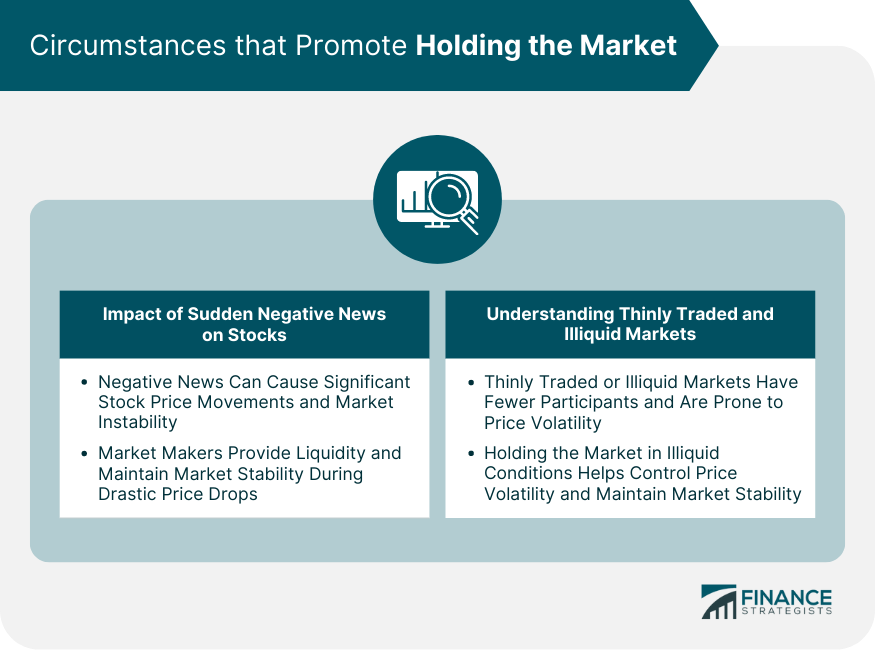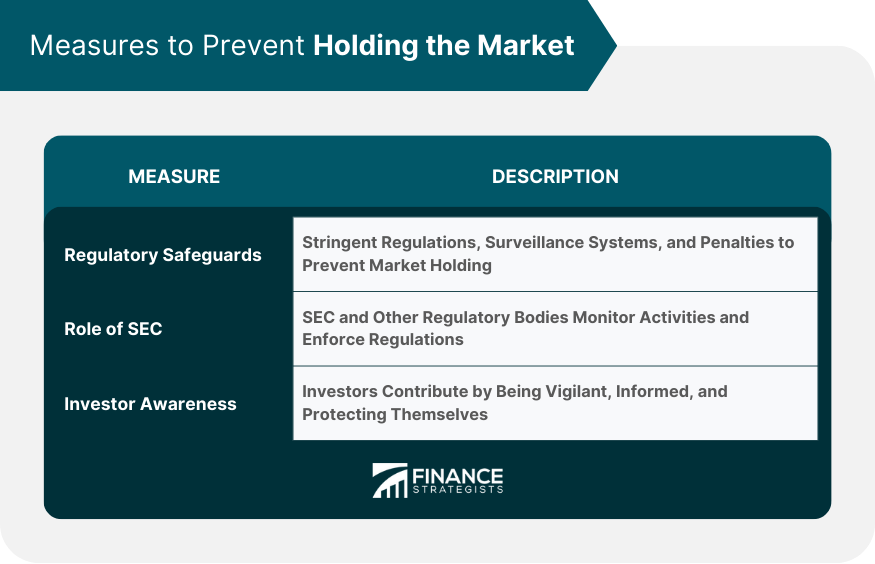"Holding the market" refers to the action of buying or holding onto securities with the intention of influencing their price or stability. This practice can be enacted by individual investors, but more commonly, by institutions or groups with significant buying power. They may hold securities to prevent a drastic drop in prices, thereby stabilizing the market. Alternatively, this strategy could be used to maintain the price level of a specific security or set of securities for strategic reasons, such as facilitating a merger or acquisition. However, "holding the market" can also artificially distort market supply and demand, and it's worth noting that manipulation of this kind is heavily regulated and often illegal. Hence, while it denotes a potential influence on market trends, the term also carries implications about market fairness and integrity. There are various circumstances that encourage holding the market. These conditions are usually driven by the need to manage price volatility and maintain order within the market. Understanding these situations is crucial for investors and financial professionals alike, as it assists in making informed decisions and planning strategies. News plays a significant role in the stock market. Positive or negative news can greatly affect a company's stock price, depending on its nature and severity. For instance, financial reports, product announcements, changes in executive leadership, legal troubles, and even rumors can trigger substantial price movements. When sudden negative news about a company breaks, it can cause the stock price to plummet. Such a rapid and drastic drop can create panic among investors and destabilize the market. This is where market makers come into play, stepping in to prevent drastic price drops and preserve market stability. Market makers are crucial players in financial markets. They provide liquidity by continuously buying and selling securities, helping to ensure that trading continues smoothly. When drastic price drops occur, market makers can step in, buying stocks to prevent further decline. By doing so, they help manage panic selling and maintain an orderly market. A market is considered thinly traded or illiquid when there is a lack of participants and securities are traded infrequently. These markets often have wide bid-ask spreads and are susceptible to price volatility due to the imbalance between supply and demand. In thinly traded or illiquid markets, holding the market becomes necessary to avoid excessive price volatility. This often involves market makers or other large financial institutions buying or selling securities to maintain liquidity and stabilize prices. In doing so, they create a more favorable environment for traders and investors, preventing extreme price fluctuations and encouraging more participation in the market. The legal landscape surrounding the concept of holding the market is complex. While the practice of holding the market is generally illegal and considered market manipulation, certain exceptions exist. Market makers or specialists, as part of their role, may have to use their own inventory to stabilize prices. This practice is regulated by bodies like the Securities and Exchange Commission in the U.S., which have stringent rules against market manipulation. The repercussions of market manipulation are severe. Market manipulators face hefty fines and prison sentences. Moreover, it erodes investor confidence and disrupts the healthy functioning of financial markets. For instance, in the case of Stratton Oakmont, Belfort was fined $110 million and sentenced to four years in prison. Market depth refers to a market's ability to sustain relatively large orders without impacting the price of a security. A deep market has sufficient volume and bid-ask spread that allows orders to be filled quickly and without significantly affecting the security's price. Liquidity plays a vital role in the concept of holding the market. Liquid markets allow for the swift execution of large-volume trades without major price fluctuations. In illiquid or thinly traded markets, holding the market might be necessary to prevent price volatility. Holding the market is a daunting task, especially considering the size and volume of modern financial markets. An individual or a single entity would need extraordinarily deep pockets to significantly impact a security's price. This feature, coupled with stringent regulatory oversight, makes illegal market holding a high-risk and often unsustainable activity. Broad market indexes, such as the S&P 500 or the Wilshire 5000, represent a significant portion of the entire stock market. They provide a comprehensive snapshot of the market's overall health and direction. Owning a broad market index, therefore, means owning a diversified representation of the entire market. Owning a broad market index comes with numerous benefits. It offers investors diversification, reducing the risk associated with owning individual securities. It also provides exposure to the broader market trends, enabling investors to participate in the general market's growth. While owning a broad market index reduces company-specific risks, it does not eliminate market risks. Investors are still exposed to the potential downturns of the entire market. In addition, index owners might miss out on the significant gains that individual stocks might experience. Regulatory bodies worldwide have established safeguards to prevent illegal market holding. These include stringent regulations, surveillance systems to detect suspicious trading activities, and penalties for market manipulations. The SEC, along with other global regulatory bodies, plays a crucial role in preventing market holding. They monitor market activities, investigate suspicious trading patterns, and enforce regulations to maintain fair and transparent markets. Investors also have a role to play in preventing market holding. By being vigilant and informed about market manipulation tactics, they can protect themselves and contribute to a healthier market environment. "Holding the market" is a concept that encompasses both illegal market manipulation and legal strategies for maintaining a diversified investment portfolio. Market makers and specialists play a crucial role in stabilizing prices and providing liquidity during periods of volatility. Understanding the complexities and legal implications of holding the market is essential for investors and financial professionals to make informed decisions and ensure market integrity. In the dynamic and intricate world of finance, seeking professional guidance and wealth management services becomes paramount. Wealth managers possess the expertise and knowledge to navigate the complexities of holding the market, maximizing opportunities while minimizing risks. They can help individuals and businesses develop customized investment strategies, build diversified portfolios, and stay abreast of changing market conditions. If you are an investor seeking to optimize your financial goals and safeguard your investments, consider engaging the services of a reputable wealth management firm. By partnering with experienced professionals, you can benefit from their expertise, gain peace of mind, and position yourself for long-term financial success. Take the proactive step today and reach out to a trusted wealth management advisor who can guide you through the intricacies of holding the market and help you achieve your financial aspirations. Remember, informed decision-making and expert guidance are vital in today's complex financial landscape.What Is "Holding the Market"?
Circumstances That Promote Holding the Market
Impact of Sudden Negative News on Stocks
Case of Negative News Impact
Market Makers: Guardians of Market Stability
Thinly Traded and Illiquid Markets
Role of Holding the Market in Thinly Traded and Illiquid Markets

Legal Implications of Holding the Market
Regulatory Framework
Consequences of Market Manipulation
Holding the Market in the Context of Market Depth and Liquidity
Concept of Market Depth
Role of Liquidity in Holding the Market
Difficulties in Holding the Market Due to Market Size
Holding the Market Through Broad Market Index Ownership
Explanation of Broad Market Indexes (e.g., S&P 500, Wilshire 5000)
Benefits of Owning a Broad Market Index
Risks Associated With Owning a Broad Market Index
Measures to Prevent Holding the Market
Regulatory Safeguards
Role of Securities and Exchange Commission (SEC) and Other Regulatory Bodies
Investor Awareness and Vigilance

Final Thoughts
Holding the Market FAQs
"Holding the market" is a term used to describe two distinct practices in the financial world. One refers to the illegal act of manipulating the market to prevent a security's price from falling. The other refers to the legal strategy of investing in a broad market index, like the S&P 500, to maintain a diversified portfolio.
In the context of broad market indexes, "holding the market" means owning a diversified representation of the entire market. By investing in these indexes, an investor essentially holds a small piece of all the companies included in the index, thus mirroring the performance of the overall market.
Holding the market is considered illegal when it involves manipulative practices to artificially prop up the price of a security, usually in response to negative news. This kind of market manipulation is illegal because it distorts market prices, misleads investors, and undermines the integrity of the financial markets.
An infamous example of illegal market holding is the 1929 Wall Street Crash, where bankers attempted, unsuccessfully, to stabilize the market by buying large amounts of stocks. A legal instance of market holding occurred during the Black Monday crash in 1987, where market makers provided liquidity to prevent the stock market from descending into chaos.
Investors can protect themselves by staying informed about market manipulation tactics and keeping an eye out for suspicious market activities. They should also consider diversifying their investment portfolio and seeking advice from financial advisors or wealth management services.
True Tamplin is a published author, public speaker, CEO of UpDigital, and founder of Finance Strategists.
True is a Certified Educator in Personal Finance (CEPF®), author of The Handy Financial Ratios Guide, a member of the Society for Advancing Business Editing and Writing, contributes to his financial education site, Finance Strategists, and has spoken to various financial communities such as the CFA Institute, as well as university students like his Alma mater, Biola University, where he received a bachelor of science in business and data analytics.
To learn more about True, visit his personal website or view his author profiles on Amazon, Nasdaq and Forbes.















